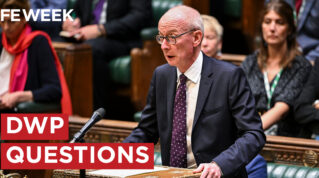Soaring energy bills, a staff recruitment crisis, and long-running funding headaches should be at the top of the new education secretary’s in-tray, industry chiefs have told FE Week.
Kit Malthouse, now at the helm of the education department faces a “daunting” to-do list for the FE sector, according to the Federation of Awarding Bodies (FAB).
At the top of that pile is the ongoing cost pressures headlined by escalating energy bills. The Association of Colleges (AoC) warned that energy bills for colleges are at risk of quadrupling, and have left colleges having to spread their already-squeezed budgets even thinner.
Funding rates for both young people and adults in further education have historically been a concern for the sector. The Sixth Form Colleges Association (SFCA) and the AoC have both called for an in-year uplift to 16 to 19 funding to help address rocketing costs – including wider cost of living pressures – while a reform and increase of bursary and free college meal funding will aid students.
In a letter to then-education secretary James Cleverly over the summer with a series of priorities, the AoC said capital projects beginning with soon supported government grants had soared in costs because of inflation, and needed an inflation adjustment to enable them to go ahead.
It also said boosting the pay of college teachers – whose salaries can be up to £9,000 behind those of school teachers – would prevent staffing issues from hampering the rollout of T Levels and higher technical qualifications.
In addition, a 10 per cent uplift in T Level funding enabled through the 16 to 19 budget underspend would address the “cost pressures on delivery and incentivise colleges to grow their T Level provision,” it said.
Holex, the industry body for adult and community education providers, has called for the government to inject £5.2 billion into basic and level 2 adult education, with a 10-year budget that “breaks the cycle of low skills, which in turn will pay for itself through a boost in productivity”.
Sue Pember from the organisation said measures such as the Multiply programme – a national scheme aimed at boosting adult numeracy skills – should be mirrored with versions for literacy and language too.
The Association of Employment and Learning Providers (AELP) over the summer outlined a series of key asks from the new prime minister and education secretary.
It included refreshed calls to temporarily re-introduce the £3,000 apprenticeship new hire incentive for employers, which it said could be funded from the underspend in the apprenticeship programme budget for new apprentices aged 16 to 24.
Elsewhere, the future role of applied general qualifications like BTECs has been raised. The SFCA’s deputy chief executive, James Kewin, urged the government to “listen to calls from the #ProtectStudentChoice campaign and abandon plans to scrap the majority of BTECs,” and “end the ongoing uncertainty surrounding these qualifications by shelving plans to run yet another bureaucratic reapproval process”.
FAB also cited bureaucratic barriers. Tom Bewick, chief executive, said: “More effective skills policies – implemented by government and employers – are the main way of equipping workers and businesses with the tools to succeed. The stark reality is that despite over a decade of hyperactive Whitehall driven reforms, the skills and productivity dashboard is flashing red. Adult skills participation has plummeted. Apprenticeships have lost their way. Achievement rates on government funded programmes are in the doldrums.”
FAB said it would like to see reform to the apprenticeship levy in order to boost starts numbers, and improve the overall national achievement rate – which for 2020/21 was 57.7 per cent.
AELP said that fully funded 16 to 18 apprenticeship training and assessment should be extended to all employers that do not pay the levy, not just those who have 50 employees or less, while an underspend in the traineeship budget could fund the introduction of a training allowance to boost the number of young people enrolling.
In the adult education sphere, the AELP said the new government must address learner numbers, and should consider doubling the current £1.3 billion investment in the adult education budget. “This would bring funding back to the level of investment a decade ago,” said AELP chief executive Jane Hickie.
Holex said it wanted to see a plan to address shortages in level 2 qualifications for subject areas such as health and care, the service sector and transport, as well as preparatory work for emerging areas like green skills.
Other broader asks from the sector included a request from FAB to streamline the complicated network of quangos, a national promotional campaign outlining the adult education offer put forward by Holex, and the AoC pressing for a VAT exemption for colleges in a similar way to schools.
















Your thoughts